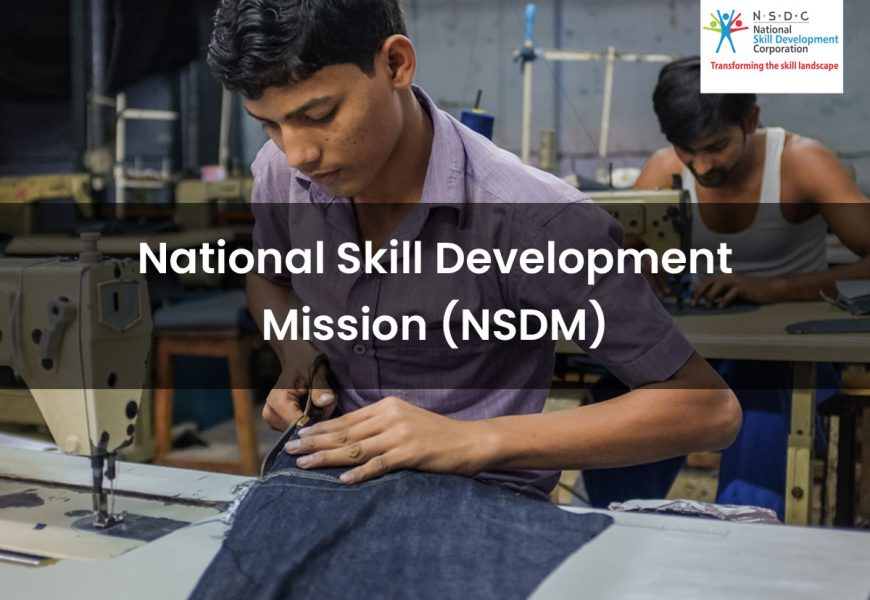The Ministry of Skill Development and Entrepreneurship, initially established as the Department of Skill Development and Entrepreneurship in July 2014, was formally set up in November 2014. Its purpose is to advance the ‘Skill India’ agenda in a ‘Mission Mode,’ aiming to unify existing skill training initiatives and enhance the scale, quality, and speed of skilling efforts.
This aim was to bridge the gap between the populace and employable sources of income. This article will cover all things important to the National Skill Development Mission.
What is the National Skill Development Mission?
The National Skill Development Mission was approved by the Union Cabinet on July 1, 2015, and officially launched by the Honorable Prime Minister on July 15, 2015, coinciding with World Youth Skills Day. This mission aims to create convergence across sectors and states in skill training activities. To achieve the vision of a ‘Skilled India,’ the mission seeks to consolidate and coordinate skilling efforts, expedite decision-making, and achieve large-scale skilling with speed and high standards.
The mission will be implemented through a streamlined institutional mechanism driven by the Ministry of Skill Development and Entrepreneurship (MSDE). The institutional framework is divided into three tiers:
- Governing Council: Provides policy guidance at the apex level.
- Steering Committee and Mission Directorate: Acts as the executive arm of the mission, with an Executive Committee supporting it.
The Mission Directorate will be supported by three key institutions:
- National Skill Development Agency (NSDA)
- National Skill Development Corporation (NSDC)
- Directorate General of Training (DGT)
These institutions will have horizontal linkages with the Mission Directorate to ensure smooth functioning.
Initially, seven sub-missions have been proposed to serve as building blocks for achieving the mission’s overall objectives. These are:
- Institutional Training
- Infrastructure
- Convergence
- Trainers
- Overseas Employment
- Sustainable Livelihoods
- Leveraging Public Infrastructure
This structured approach aims to enhance the effectiveness and efficiency of skill development efforts nationwide.
Objectives of NSDM
The National Skill Development Mission was launched with certain objectives in mind that it aimed to achieve. Let’s discuss them briefly below:
- Develop a comprehensive framework for skill development that offers lifelong learning opportunities. This encompasses incorporating skill training into the school curriculum, providing high-quality short-term and long-term training, ensuring gainful employment, and facilitating career progression aligned with trainees’ aspirations.
- Align employer and industry demand with trainees’ aspirations for sustainable livelihoods by creating a framework focused on outcomes.
- Establish and enforce cross-sectoral standards for skill training that are nationally and internationally recognised, creating a robust quality assurance framework applicable to all ministries, states, and private training providers.
- Enhance capacity for skill development in key unorganised sectors, such as construction, where training opportunities are scarce. This includes creating pathways for reskilling and upskilling workers to help them transition into formal sector employment.
- Provide high-quality options for long-term skill training benchmarked to internationally accepted qualification standards, contributing to a highly skilled workforce.
- Build a network of quality instructors and trainers within the skill development ecosystem by setting up high-quality teacher training institutions.
- Utilise existing public infrastructure and industry facilities to scale up skill training and capacity-building efforts.
- Facilitate overseas employment opportunities through specific programs aligned with global job requirements and international standards.
- Create pathways for transitioning between vocational training and formal education systems through a credit transfer system.
- Promote coordination and convergence between skill development efforts of all central ministries, departments, states, and implementing agencies.
- Support disadvantaged sections of society through targeted outreach programs and skill development activities.
- Enhance the aspirational value of skill training among youth by raising social awareness about its importance.
- Maintain a national database, the Labour Market Information System (LMIS), which will match the demand and supply of skilled labor. The LMIS will provide essential information on skill initiatives across the country and serve as a platform for monitoring the performance of existing skill development programs in every Indian state.
Mission Strategy
The National Skill Development Mission will initially include seven sub-missions, each serving as a fundamental component for reaching the Mission’s overall objectives. The key focus areas of these submissions are:
- Addressing both long-term and short-term skill development needs by revamping the existing institutional training framework and establishing new institutions.
- Implementing sector-specific skill training initiatives.
- Ensuring convergence of current skill development programs.
- Utilising existing public infrastructure for skill training.
- Emphasising the training of trainers.
- Facilitating overseas employment opportunities.
- Promoting sustainable livelihoods.
Key Institutions for NSDM
National Skill Development Corporation (NSDC)
The National Skill Development Corporation (NSDC) plays a crucial role in supporting the National Skill Development Mission through various capacity-building initiatives and by assisting private training partners. Key functions of NSDC include:
- NSDC helps catalyse the creation of scalable, market-based businesses by providing funding through a mix of debt, equity, and grants.
- It implements the skills voucher programme to provide financial support for skill training.
- NSDC actively engages with industry and businesses to align training with market needs.
- In collaboration with States and Sector Skills Councils (SSCs), NSDC promotes centres of excellence focused on training trainers.
- It initiates and incubates SSCs to develop industry-specific skill standards and training programs.
Directorate General of Training (DGT)
The Directorate General of Training (DGT) under the Ministry of Skill Development and Entrepreneurship oversees two main verticals: Training and Apprenticeship, which were transferred from the Ministry of Labour and Employment (MoLE) on April 16, 2015. These verticals operate through the Directorate of Training and Directorate of Apprenticeship Training, respectively. The DGT is responsible for maintaining the existing skill training infrastructure in the country via the National Council for Vocational Training (NCVT). This extensive institutional network includes Industrial Training Institutes (ITIs), Advanced Training Institutes (ATIs), Regional Vocational Training Institutes (RVTIs), and other national institutes, all of which serve as key execution tools for the Mission’s activities.
Other functions of the DGT include:
- Establishing a framework for course structure, assessment, curriculum development, and the affiliation and accreditation of institutes under the NCVT.
- Developing national standards for syllabi, equipment, space requirements, course duration, and training methods.
- Advising on training policy within its network of training institutes.
- Coordinating the functioning of Industrial Training Institutes (ITIs).
- Running instructor training programs to train the trainers.
- Operating special institutes focused on training women.
- Providing technical support for vocational education across the country.
- Anchoring and operationalising the Apprentices Act, 1961.
- Implementing various training schemes through ITIs and Vocational Training Providers (VTPs).
Government Initiatives under NSDM
There are several schemes and programs launched by the government to promote skill development in India.
- Pradhan Mantri Kaushal Vikas Yojana (PMKVY): This flagship scheme aims to provide free skill training opportunities to the youth of India, enhancing their employability.
- Skills Strengthening for Industrial Value Enhancement (STRIVE): Focused on improving the performance of Industrial Training Institutes (ITIs), this World Bank-assisted project aims to enhance the relevance and efficiency of skills training through ITIs and apprenticeships.
- Skill Saathi Counseling Program: Launched by the Ministry of Skill Development and Entrepreneurship (MSDE), this program aims to inform and inspire the youth about various opportunities under the Skill India Mission, thereby increasing their aspirations for skill development.
- SANKALP (Skills Acquisition and Knowledge Awareness for Livelihood Promotion): This centrally sponsored scheme, in collaboration with the World Bank, focuses on strengthening the district-level skilling ecosystem through convergence and coordination.
- Pradhan Mantri Kaushal Kendra (PMKK): These state-of-the-art model training centers are designed to set benchmarks for competency-based skill development training, demonstrating aspirational value.
- Industrial Training Centres (ITIs): The initiative aims to expand and modernise the existing long-term training ecosystem in India, enhancing vocational training infrastructure.
- Vocational Courses in Schools: MSDE is working closely with CBSE to develop “Hubs of Excellence in Skills” for school students, introducing high-quality, technology-oriented skill programs to schools.
These initiatives collectively aim to build a robust skill development ecosystem in India, catering to various sectors and levels of education and training.
FAQs on National Skill Development Mission
Who is the head of NSDC?
Mr. A.M. Naik has been appointed as the Chairman of the National Skill Development Corporation (NSDC) by the Ministry of Skill Development and Entrepreneurship.
What is the Skill Loan Scheme?
The Skill Loan Scheme was introduced to support young individuals who wish to enroll in skill training programs across the country. This scheme replaces the previous Indian Banks' Association (IBA) Model Loan Scheme for Vocational Education and Training, making it easier for youth to access financial assistance for skill development.
What is the aim of the National Skills Development Mission?
The aim of the National Skills Development Mission is to scale up skill development efforts in India significantly. It seeks to create an end-to-end, outcome-focused implementation framework that aligns employers' demands for a skilled workforce with the aspirations of Indian citizens for sustainable livelihoods.
















Great. I like your website